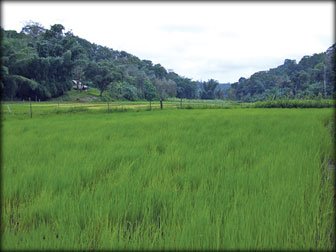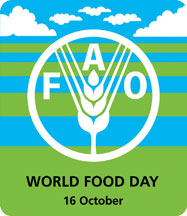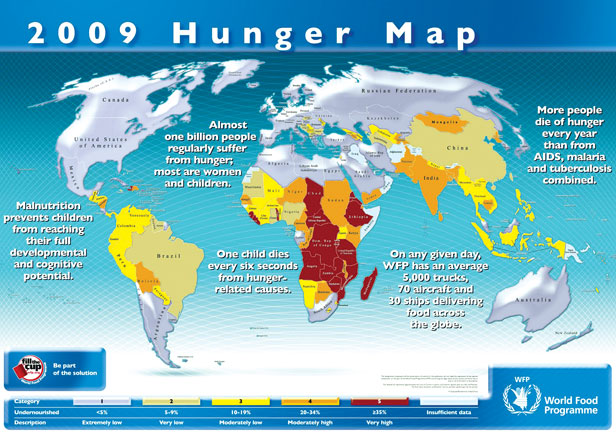|
World Food Day on October 16:
Unite to stave off hunger
By Pramod DE SILVA
  One
billion people worldwide suffer from hunger. Yes, you read that right.
It is hard to believe, but true! One-sixth of the world's population
does not have enough to eat. This is the 'unseen shame' of the modern
world. One
billion people worldwide suffer from hunger. Yes, you read that right.
It is hard to believe, but true! One-sixth of the world's population
does not have enough to eat. This is the 'unseen shame' of the modern
world.
It is simply unacceptable as people in some parts of the world have
excess food, which is thrown away. Hunger, malnutrition and poverty are
part of a vicious cycle that has engulfed much of the world. In 2009,
the critical threshold of one billion hungry people in the world was
reached in part due to soaring food prices and the financial crisis.
While these difficulties have abated to some extent, the core problem
of hunger remains. The world needs to fight hunger, together. It is not
a very difficult task. If the developed countries can slash their
defence expenditure even by a fraction, hunger could be reduced
drastically. According to the World Food Programme, just one US dollar
can feed four children a day.
As we mark the 30th World Food Day (WFD) on Saturday, there is a
greater understanding of the steps that should be taken to end hunger
worldwide. The theme of this year's WFD is United Against Hunger, chosen
to recognise the efforts made in the fight against world hunger at
national, regional and international levels. Incidentally, this year
also marks the 65th anniversary of the Food and Agriculture Organisation
(FAO) of the UN.
The FAO has launched an online petition to reflect the moral outrage
of the situation. The "one billion hungry project" reaches out to people
through online social media to invite them to sign the anti-hunger
petition at www.1billionhungry.org.
 The
goal is to defeat hunger, extreme poverty and malnutrition. The UN's
Millennium Development Goals call for the eradication of extreme poverty
and hunger, including halving the hungry people in the world by 2015,
which is just four years away. The World Summit on Food Security, or the
"Hunger Summit", held in Rome in November 2009, adopted a declaration
renewing the commitment made at the 1996 World Food Summit to eradicate
hunger sustainably from the face of the Earth. The
goal is to defeat hunger, extreme poverty and malnutrition. The UN's
Millennium Development Goals call for the eradication of extreme poverty
and hunger, including halving the hungry people in the world by 2015,
which is just four years away. The World Summit on Food Security, or the
"Hunger Summit", held in Rome in November 2009, adopted a declaration
renewing the commitment made at the 1996 World Food Summit to eradicate
hunger sustainably from the face of the Earth.
The Declaration also called for an increase in domestic and
international funding for agriculture, new investments in the rural
sector, improved governance of global food issues in partnership with
relevant stakeholders from the public and private sector, and more
action to face the threat climate change poses to food security.
Modern methods
An increase in funding for agriculture, especially modern methods of
agriculture, is essential at this stage. In fact, food production will
have to increase by 70 percent to feed a population of nine billion
people by 2050. Yet, there are many challenges that could impede this
plan.
There is a land and water scarcity in most parts of the world. With
land scarcity, farmers try to get greater yields out of the land already
under cultivation rather than expanding their farms. But the FAO notes
that intensified food production has traditionally meant increased
dependence on pesticides and fertiliser and overuse of water, which can
degrade soils and water resources. The right balance has to be struck to
appease both farmers and consumers while protecting the environment.
 Another
fact that often goes unnoticed is the massive wastage of food products
in the post-harvest stage due to the lack of proper transport and
storage methods. We have often experienced this in Sri Lanka, where
seasonal gluts are common for certain varieties of fruit and vegetable.
If post-harvest losses can be minimised, more people can be fed. Another
fact that often goes unnoticed is the massive wastage of food products
in the post-harvest stage due to the lack of proper transport and
storage methods. We have often experienced this in Sri Lanka, where
seasonal gluts are common for certain varieties of fruit and vegetable.
If post-harvest losses can be minimised, more people can be fed.
Crop yields
Technology can and does play a role in increasing food production.
Modernisation (the use of farm machinery, better hybrid seed varieties
etc) has the potential to raise yields. Genetically Modified foods may
be controversial, but what if that is a method to prevent hunger?
Fifty percent of the increases in global crop yields achieved between
1965 and 2000 were due to improved plant genetics, the remaining 50
percent due to combinations of improved water supply, fertiliser, and
field crop management practices. Irrigation is a vital cog in the
agriculture wheel. Worldwide, there are many disused irrigation systems
and reservoirs which can be revived and put to use. The world needs a
new Green Revolution to stave off hunger.
Regional initiatives, especially in the developing bloc, are
essential to ensure food security for their peoples. The South Asian
Association for Regional Cooperation (SAARC) of which Sri Lanka is a
member has initiated such a venture, through a SAARC Food Bank which can
respond swiftly in a food emergency.
Research on food and agriculture at regional and global level is also
needed to meet the future challenges. There should be more North-South
cooperation in this sphere. There have been many instances where
developed countries have obtained 'patents' for food products which are
actually grown and produced in the developing world. This should not be
the case, since food is a global concern. Research should mainly focus
on better-yielding, disease resistant crop varieties. It will be
impossible to grow food for nine billion people without using mineral
fertiliser, but more research should be undertaken on organic fertiliser.
Pest control
 Integrated
pest management or IPM is another approach - it combines pest resistant
varieties, biological pest control, cultural practices and judicious use
of pesticides to increase production, lower costs and reduce water and
soil contamination. Optimising the use of pesticides is not good for the
environment and human health, but it also saves the farmer money. Yes,
the farmer is at the heart of agriculture. All these efforts would be in
vain if the farmer is forgotten. An astonishing 70 percent of the
world's population is directly or indirectly dependent on agriculture.
Farmers and their families represent some 2.5 billion people, more than
one-third of the global population. Helping them to modernise is one way
of lifting them out of the poverty trap. Integrated
pest management or IPM is another approach - it combines pest resistant
varieties, biological pest control, cultural practices and judicious use
of pesticides to increase production, lower costs and reduce water and
soil contamination. Optimising the use of pesticides is not good for the
environment and human health, but it also saves the farmer money. Yes,
the farmer is at the heart of agriculture. All these efforts would be in
vain if the farmer is forgotten. An astonishing 70 percent of the
world's population is directly or indirectly dependent on agriculture.
Farmers and their families represent some 2.5 billion people, more than
one-third of the global population. Helping them to modernise is one way
of lifting them out of the poverty trap.
In the meantime, there are plenty of steps we can take to ensure food
for all. WFP Executive Director Josette Sheeran has outlined several
such steps that could address world hunger in the short to medium term.
Among them are humanitarian action (providing food assistance in
disasters such as earthquakes, floods), school meals (Sri Lanka has a
program on these lines), safety net or backup plan for food distribution
in crisis situations, connecting small-time farmers to markets in the
city, first 1,000 days (better nutrition for infants in the first 1,000
days), empowering women in agriculture, technology revolution for
agriculture and related fields and building resiliency in societies to
meet food emergencies.
The challenges are thus immense, almost Herculean. But a catastrophic
food crisis can be averted if the world gets 'United Against Hunger'
right now. |

